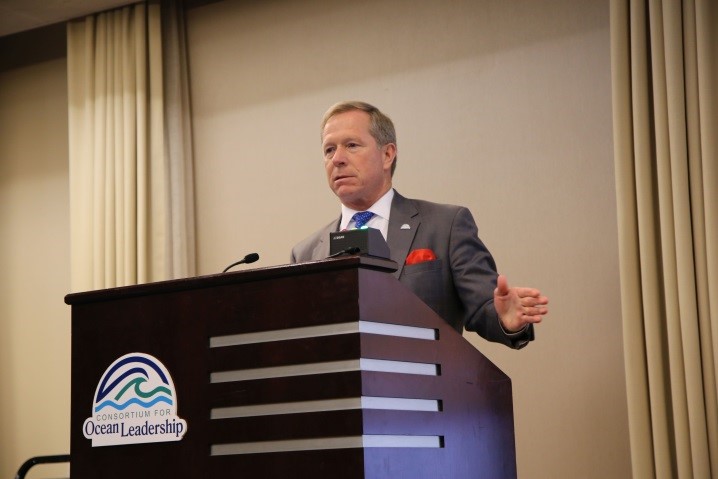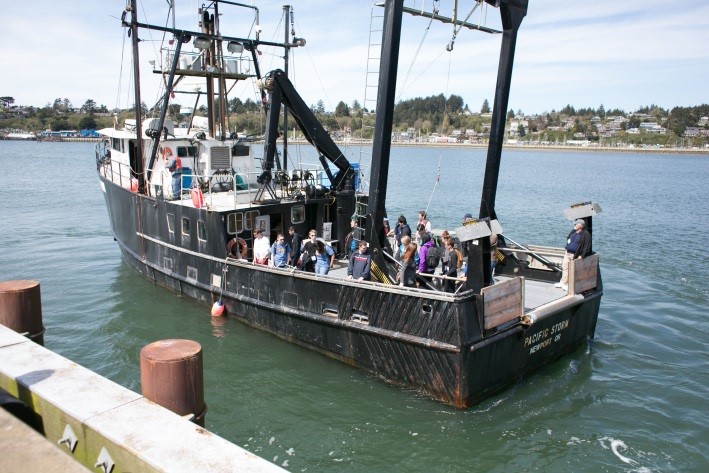By Jonathan White (President and CEO) and Callan Yanoff (Science and Education Community Support), Consortium for Ocean Leadership
The ocean impacts every single human life—it supplies oxygen, medicine, and food. If the sea is our most precious resource, why aren’t organizations across the globe better communicating about breakthroughs in ocean science?
The Co nsortium for Ocean Leadership (COL) supports every aspect of oceanic discovery across the globe. A nonprofit organization representing the leading ocean science and technology institutions, we shape the future of ocean science and technology by advancing ocean research and education programs related to ocean exploration, observing, and partnerships. In doing so, we have managed over a billion dollars in science funding in activities ranging from advancing ocean observing capabilities to studying the impacts of the Deepwater Horizon oil spill and have advocated for sound science policy and funding on Capitol Hill.
nsortium for Ocean Leadership (COL) supports every aspect of oceanic discovery across the globe. A nonprofit organization representing the leading ocean science and technology institutions, we shape the future of ocean science and technology by advancing ocean research and education programs related to ocean exploration, observing, and partnerships. In doing so, we have managed over a billion dollars in science funding in activities ranging from advancing ocean observing capabilities to studying the impacts of the Deepwater Horizon oil spill and have advocated for sound science policy and funding on Capitol Hill.
As our ocean faces daunting challenges, there are great opportunities for collaboration to ensure its health and future, and we look to new and improved collaboration with the European Union. We believe some fruitful topics for possible alliance include addressing the issue of ocean sound, increasing exploration research, encouraging sustainable aquaculture, and making logical choices about decommissioned oil rigs. Ocean literacy is another collaborative opportunity, and a program we hope to see spread internationally is our National Ocean Sciences Bowl (NOSB), which provides informal ocean science education for high school students.
Opportunities for Collaboration
Expanding ongoing international collaboration among these U.S. research activities promises great advances and new discoveries.
Building Alliance to Better Understand Ocean Sound. While our interest in the topic may vary, ocean noise impacts all regions of the world. There is much about the topic we don’t know but need to as we consider the implications of our activities in, on, and around the ocean. We must study and utilize emerging technologies to close this knowledge gap and seek to come together as a team across the international ocean science and technology communities to inform the best possible decisions and behaviors regarding the sound we put into the sea.
Expanding Ocean Exploration Efforts. The vast majority of our ocean remains unexplored. Through greater international partnerships, we can build more efficient ocean campaigns that are focused around exploration activities that include the deep ocean and Artic. In the U.S., there are many governmental and philanthropic organizations that are involved in exploration, including the National Oceanic and Atmospheric Administration (NOAA), which has a congressionally mandated ocean exploration program. We are encouraged by the Galway Statement on Atlantic Ocean Cooperation, which has provided the basis for ongoing collaboration between NOAA and the European Commission’s Joint Research Centre. At the same time, there are additional thematic opportunities around exploration technologies that can be advanced through collaboration between the U.S. and the EU. For example, expanding the usage of environmental DNA (eDNA) to assess and monitor the nature and dynamics of marine life and ecosystems. We must also further our ability to use emerging technology focused around the miniaturization of ocean exploration equipment and for artificial intelligence allowing sensors to adapt to their behaviors based on the conditions they observe.
Improving Worldwide Aquaculture. As aquaculture spreads around the world, the time is right to transform this industry. The ocean plays a major role in nourishing the expanding global human population. Food safety and food security are two important elements of this discussion. Seafood fraud; illegal, unreported, and unregulated fishing; mariculture; wild-caught fisheries bycatch; crop fertilizers containing fish meal; and how these all connect to our global health and security are critical considerations. We hope to team up with the EU and other countries to make aquaculture not only sustainable but economically beneficial and with improved public understanding.
Making Thorough Decisions on Oil Rigs. The U.S. and many European nations face difficult decisions related to the removal or reconfiguring of decommissioned oil rigs and determining which decision is most environmentally beneficial. COL’s 2017 Industry Forum will focus on identifying alternative and innovative opportunities for re-use of nonactive, decommissioned oil rigs. The forum is unique in its specific goal for cross-sector science- and technology-based dialogue to identify potential resolutions to controversy surrounding these decommissioned rigs, as well as opportunities for science, business, and ecosystems. To expand this conversation on a broader scale, it would be ideal to follow up with a similar international event.
 Increasing Ocean Science Education. The National Ocean Sciences Bowl (NOSB) is a U.S. academic competition that addresses a national gap in ocean sciences in public education by introducing high school students to and engaging them in ocean science. This program prepares participants for science, technology, education, and mathematics (STEM) careers and helps them become ocean-literate citizens and environmental stewards. Throughout the last 20 years, the NOSB has created ocean science professionals and increased ocean literacy. Building STEM knowledge and ocean appreciation across the world will build a citizenry that prioritizes conserving our oceans, guaranteeing a healthier future.
Increasing Ocean Science Education. The National Ocean Sciences Bowl (NOSB) is a U.S. academic competition that addresses a national gap in ocean sciences in public education by introducing high school students to and engaging them in ocean science. This program prepares participants for science, technology, education, and mathematics (STEM) careers and helps them become ocean-literate citizens and environmental stewards. Throughout the last 20 years, the NOSB has created ocean science professionals and increased ocean literacy. Building STEM knowledge and ocean appreciation across the world will build a citizenry that prioritizes conserving our oceans, guaranteeing a healthier future.
There are ultimately numerous fields within the ocean sciences for partnership between the U.S. and the EU. COL, representing multinational and U.S. academia, industry and other stakeholders, can help to deepen ties and establish partnerships between these communities and like stakeholder groups in Europe with a goal to share research and data and improve regional-to-global understanding of our ocean.
